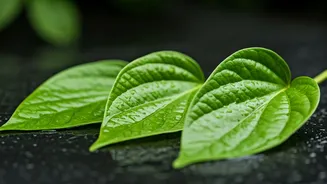Betel Leaf Basics
Betel leaves, scientifically known as Piper betle, have a significant presence in India's cultural and traditional practices. They are commonly chewed
with areca nut, slaked lime, and other ingredients, forming the popular paan. Beyond their cultural significance, these leaves are packed with various bioactive compounds, including antioxidants, vitamins, and minerals. Historically, betel leaves have been utilized in Ayurvedic medicine for their therapeutic qualities. Today, researchers are investigating the full extent of betel leaves' health advantages, making it an increasingly relevant topic in wellness discussions.
Blood Sugar Support
Betel leaves may play a role in regulating blood sugar levels. Studies suggest that certain compounds in these leaves could help improve insulin sensitivity and glucose metabolism. These findings indicate a possible benefit for people with or at risk of type 2 diabetes. By incorporating betel leaves into your diet, perhaps through chewing or consuming extracts, one might assist in maintaining balanced blood sugar levels. However, it's essential to consult with healthcare professionals before making significant changes to your diet, especially if you have pre-existing health conditions or are taking medication.
Oral Health Benefits
Betel leaves have been traditionally used to promote oral health. They possess antibacterial properties that can help combat harmful bacteria in the mouth, reducing the risk of dental problems such as cavities and gum disease. Chewing betel leaves is believed to stimulate saliva production, which aids in neutralizing acids and keeping the mouth clean. Moreover, the leaves' refreshing effect can help combat bad breath. In some regions, betel leaves are considered a natural remedy for mouth ulcers and other minor oral issues, highlighting their potential as a component of an effective oral hygiene regimen.
Liver Protection Potential
The antioxidants in betel leaves are recognized for their potential protective effects on the liver. The liver is vital for detoxification, and betel leaves can help shield it from damage by neutralizing harmful free radicals. Studies indicate that betel leaves may help improve liver function by reducing inflammation and supporting the regeneration of liver cells. This liver-protective effect makes betel leaves a possible natural approach to maintaining liver health. However, further research is required to fully understand the mechanisms and scope of these advantages.
Aiding Digestion Naturally
Betel leaves have been used traditionally as a digestive aid. They are believed to stimulate the production of digestive enzymes, which help in breaking down food and easing digestion. Moreover, these leaves possess carminative properties that help to relieve flatulence and bloating. In some cultures, chewing betel leaves after meals is common practice to facilitate digestion. The compounds present in betel leaves appear to assist in promoting a healthy gut environment, aiding the body's natural digestive processes.
Wound Healing Properties
Betel leaves have been utilized for their wound-healing abilities. They contain compounds that can stimulate blood clotting, which is vital in wound healing. Applying a paste of betel leaves to minor cuts and scrapes is considered a traditional method to accelerate healing. The antibacterial qualities of these leaves also help in preventing infection in wounds. While scientific research is ongoing, initial findings propose that betel leaves can support the skin's natural repair processes. Using betel leaves for minor wounds is a remedy used in many parts of India.
Betel Leaves and More
Beyond the previously mentioned advantages, betel leaves offer other potential health benefits. Some studies suggest that they might possess anti-inflammatory properties, making them useful in managing chronic inflammation. Betel leaves are also thought to boost immunity due to their antioxidant content, supporting the body's defenses. It is important to note that, while these results are promising, more comprehensive research is needed to validate these benefits and determine safe and effective dosages. One should consult with a healthcare professional before incorporating betel leaves into their diet, especially if you're managing any pre-existing health conditions or are taking medication.


















